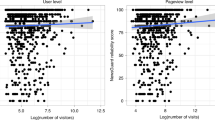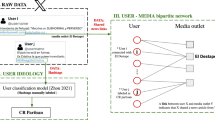Abstract
As news media have been expected to provide valuable news contents to readers, credibility of each medium depends on what news contents it has created and delivered. In traditional news media, staff editors look into news articles and arrange news contents to enhance their media credibility. By contrast, in social news services, general users play an important role in selecting news contents through voting behavior as it is practically impossible for staff editors to go through thousands of articles sent to the services. However, although social news services have strived to develop news ranking systems that select valuable news contents utilizing users’ participation, they still represent popularity rather than credibility, or give users too much burden.
In this paper, we examined whether there is a group of elite users who votes for articles whose journalistic values are higher than others. To do this, we firstly assessed journalistic values of 100 social news contents with a survey. Then, we extracted a group of elite users based on what articles they had voted for. To prove that the elite group shows a tendency to vote for journalistically valuable news contents, we analyzed their voting behavior in another news pool. Finally, we concluded with a promising result that news contents voted by the elite users show significantly higher credibility scores than other news stories do while the number of votes from general users is not significantly correlated with the scores.
Access this chapter
Tax calculation will be finalised at checkout
Purchases are for personal use only
Preview
Unable to display preview. Download preview PDF.
Similar content being viewed by others
References
Bowman, S., Willis, C.: We Media: How Audience are Shaping the Future of News and Information, p. 9. The Media Center at The American Press Institute (2003)
The Pew Research Center for the People & the Press, http://people-press.org/reports/pdf/479.pdf
Slashdot’s meta moderation, http://slashdot.org/moderation.shtml
Hovand, C.I., Weiss, W.: The Influence of Source Credibility on Communication Effectiveness. In: Public Opinion Quarterly, vol. 15, pp. 635–650. Oxford University Press, Oxford (1951)
Infante, D.A.: The Construct Validity of Semantic Differential Scales for the Measurement of Source Credibility. Communication Quarterly 28(2), 19–26
Gaziano, C., McGrath, K.: Measuring the Concept of Credibility. Journalism and Mass Communication Quarterly 63(3), 451–462 (1986)
Rimmer, T., Weaver, D.: Different Questions, Different Answers? Media Use and Media Credibility. Journalism Quarterly 64, 28–44 (1987)
Ognianova, E.: The Value of Journalistic Identity on the World Wide Web. Paper presented to the The Mass Communication amd Society Division, Association for Education in Journalism and Mass Communication, Balimore (1998)
Kiousis, S.: Public Trust or Mistrust? Perceptions of Media Credibility in the Information Age. Paper presented to the The Mass Communication amd Society Division, Association for Education in Journalism and Mass Communication, New Orleans (1999)
Lampe, C., Garrett, R.K.: It’s All News to Me: The Effect of Instruments on Rating Provision. Paper presented to the Hawaii International Conference on System Science, Waikoloa, Hawaii (2007)
Ko, J.S., Kim, K., Kweon, O., Kim, J., Kim, Y., Han, S.: Open Editing Algorithm: A Collaborative News Promotion Algorithm Based on Users’ Voting History. In: International Conference on Computational Science and Engineering, pp. 653–658 (2009)
Surowiecki, J.: The Wisdom of Crowds. Anchor Books, New York (2005)
Author information
Authors and Affiliations
Editor information
Editors and Affiliations
Rights and permissions
Copyright information
© 2010 Springer-Verlag Berlin Heidelberg
About this paper
Cite this paper
Kim, K., Park, H., Ko, J., Kim, Yr., Han, S.S. (2010). Finding Elite Voters in Daum View: Using Media Credibility Measures. In: Breslin, J.G., Burg, T.N., Kim, HG., Raftery, T., Schmidt, JH. (eds) Recent Trends and Developments in Social Software. BlogTalk BlogTalk 2008 2009. Lecture Notes in Computer Science, vol 6045. Springer, Berlin, Heidelberg. https://doi.org/10.1007/978-3-642-16581-8_4
Download citation
DOI: https://doi.org/10.1007/978-3-642-16581-8_4
Publisher Name: Springer, Berlin, Heidelberg
Print ISBN: 978-3-642-16580-1
Online ISBN: 978-3-642-16581-8
eBook Packages: Computer ScienceComputer Science (R0)




